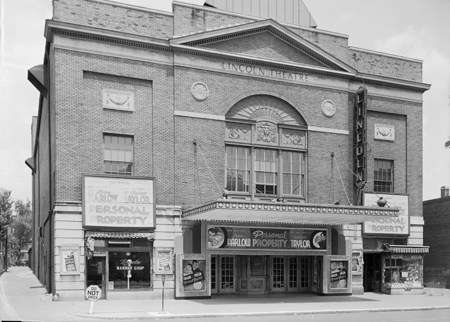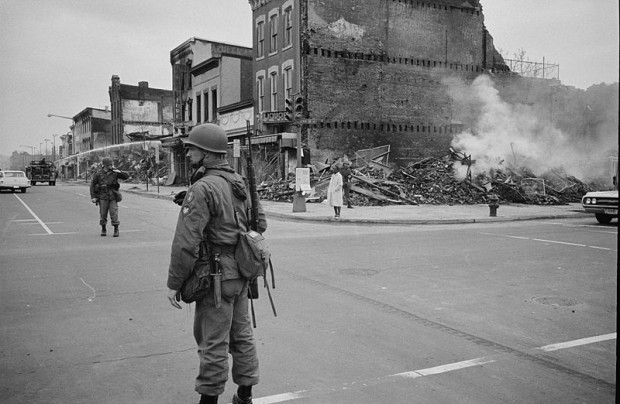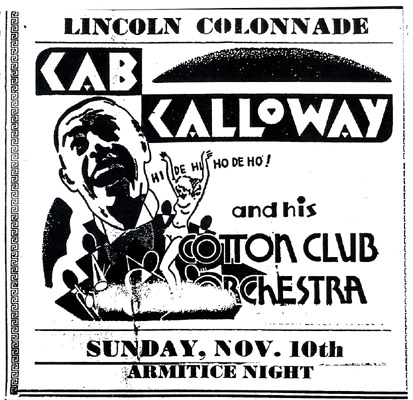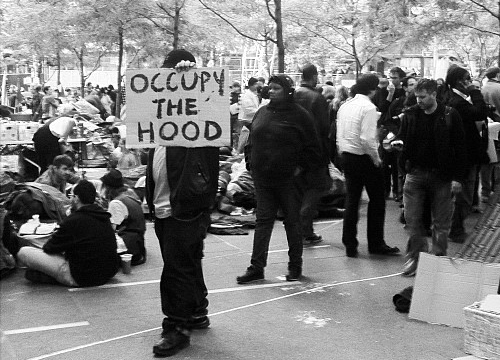It’s well-documented that access to healthcare is limited for the poor and minorities, even here in D.C. Our sister blog Multi-American reports on a new study finding doctors who primarily treat Latino patients aren’t confident they’re able to give patients high-quality care.
Author Archives: Elahe Izadi
A Look Back: Lincoln Theatre and Black Broadway
The Lincoln Theatre is approaching its 90th anniversary as a cultural beacon of the U Street district. But impending closure threatens to break an important chain in D.C. history.
The theater opened in 1922 at 12th and U Streets, at the height of the racial ghettoization of D.C. Although the District outlawed Jim Crow laws in 1917, segregation became a reality in D.C. Racially restrictive housing covenants and Depression-era laws ended up restricting housing and services to non-whites in certain neighborhoods.
In the face of this, U Street evolved into Black Broadway, an inimitable nexus of businesses, civil institutions, entertainment venues and homes. The area first experienced a boom after the Civil War, as thousands of new residents moved from the south. Between 1900 and 1948, U Street proved a vital epicenter for those suffering under the legacy of slavery.
DCentric Picks: MLK Memorial Dedication, ‘Dream City’ Discussion
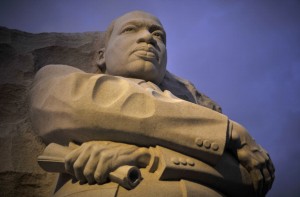
Mladen Antonov / AFP/Getty Images
What: The Martin Luther King, Jr. National Memorial dedication ceremony.
Where: West Potomac Park.
When: 9 a.m., Sunday.
Cost: Free.
Why you should go: The dedication of the memorial, the first on the National Mall to honor an African American, was initially scheduled for Aug. 28. But it was canceled due to Hurricane Irene. Although the memorial has been open to the public for more than a month now, the ceremony will feature remarks by members of King’s family and President Barack Obama.
Other events to consider: Greater Greater Washington is hosting a discussion between the authors of “Dream City: Race, Power, and the Decline of Washington, D.C.” In the 1990s, Harry Jaffe and Tom Sherwood wrote about the rise and fall of former Mayor Marion Barry in the context of D.C.’s political and racial struggles. D.C. is now going through a new round of changes. Washington Post reporter Mike DeBonis will moderate the talk, which takes place at 7 p.m., Monday, at the Shaw Library. (Disclosure: Sherwood is a resident analyst on WAMU 88.5′s Kojo Nnamdi show).
‘Occupy the Hood’ and How to Boost Protest Diversity
The Occupy protests against corporate greed have brought together a broad coalition of people, but there have been questions about whether the crowds assembled are racially representative.
Enter Occupy the Hood, a sub-movement that started in New York and Detroit and is now spreading to other cities, including D.C. The goal is to get more people of color involved in Occupy protests and ensure their voices are heard. Friends Julian Liser, 21, and Drew Franklin, 24, started the D.C. branch last week. They say the protests in D.C., where 61 percent of the population is non-white, should be attracting more people of color, particularly from economically depressed communities since they are hardest-hit by the economic woes at the center of the movement.
“Itâs important that minorities are also aware of whatâs going on, and they should also feel this movement is important for them, too,â Liser, who is black, says. âItâs kind of hard to explain that to them because they just see people around K Street protesting something. They donât see how it affects them.â
Liser’s story is similar to many of the white protestors on K Street. He’s unemployed and was motivated to join Occupy DC after learning about the new Bank of America debit card fees. Such fees are “killing my account,” Liser says.
“Occupy DC: A 1-Percenter Makes Common Cause With The Other 99″
HuffPost DC chats with a millionaire who’s joined Occupy DC protesters. Virginia Leavell, who inherited her money, says she comes from generations of southern land owners.
D.C. College Still One of the Most Expensive in Nation
If you’re hunting for a frugal way to get educated, don’t look to George Washington University. The school is only $25 shy of being in Forbes’ top 10 most expensive colleges.
“Latinos Decry ‘Secure Communities’ Policy In D.C.”
Secure Communities is a federal program requiring law enforcement to send fingerprints of those arrested to immigration officials. D.C. has thus far refused to participate in Secure Communities, but WAMU 88.5′s Patrick Madden reports that it may soon be mandatory in all jurisdictions.
The program is intended to target violent criminals, but it’s been blasted for causing the deportation of victims of domestic violence and witnesses. Critics say that such an approach leads to distrust between immigrant communities and police.
“Report finds art funding serves wealthy audience, is out of touch with diversity”
D.C.-based watchdog group National Committee for Responsive Philanthropy issued a report finding the vast majority of arts funding goes to organizations that attract disproportionately wealthy and white audiences [PDF].
The group suggests targeting funding to grassroots and community based arts organizations with explicit missions to benefit racial minorities, the poor and the elderly. Report authors also write that funders should ensure arts organizations focused on promoting the Western European canon do more to attract diverse audiences.
Obama Expedites D.C. Project
The Obama Administration has chosen a D.C. project as one of 14 that will get expedited through approval processes. The CityMarket at O in Shaw will include a brand new Giant to replace a deteriorating one that closed last month. The 14 projects got the special treatment because they will create much-needed jobs, according to the White House.
Columbus Day: Your Take
Yesterday, we asked whether Columbus Day should remain a federal holiday. And the majority of you responded “no,” in our admittedly unscientific poll. Alternatively, about 27 percent said it should remain a federal holiday, mostly because “we can’t vilify historical figures based on today’s moral standards.” The majority disagreed, voting that we shouldn’t have the day off to honor Columbus either because it’s offensive or because he didn’t discover anything:
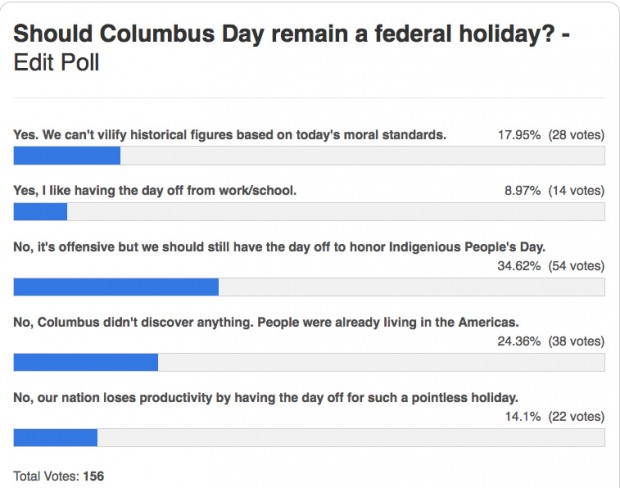
A number of you offered additional thoughts on the issue. Some groups have been lobbying for the day to be commemorated as Indigenous People’s Day instead of Columbus Day. Reader Guest had a different suggestion:




